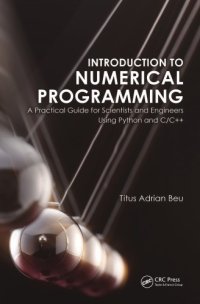
Ebook: Introduction to numerical programming: a practical guide for scientists and engineers using Python and C/C++
Author: Titus A. Beu
- Tags: Physics, Data processing., Engineering, Data processing., Computer programming., Python (Computer program language), C (Computer program language), C++ (Computer program language)
- Series: Series in computational physics
- Year: 2015
- Publisher: CRC Press
- Language: English
- pdf
Abstract: "This book introduces numerical programming using Python and C/C++, emphasizing methods used in physics and engineering. Its helps readers develop the ability to navigate relevant algorithms, knowledge of coding design, and efficient scientific programming skills. It requires minimal background in mathematics, leading readers from elementary methods to complex algorithms useful in modern programming. It incorporates examples and real code throughout, as well as problem sets, to facilitate a hands-on learning experience. "--
"This book is devoted to the general field of numerical programming, with emphasis on methods specific to computational physics and engineering. While tremendous advances of computer performances have been achieved in recent years, numerical methods still remain virtually inexhaustible resources for extending the range of challenging real-life problems made tractable. Along these lines, the book sets as its primordial goal to contribute to fostering interest in numerical programming by making computations accessible and appealing to broader categories of scientists and engineers. I have written this book for advanced undergraduate and graduate students in natural sciences and engineering, with the aim of being suited as curriculum material for a one- or two-semester course in numerical programming based on Python or C/C++. The book may also be used for independent study or as a reference material beyond academic studies. It may be useful, for instance, as an introductory text for researchers preparing to engage in scientific computing, or engineers needing effective numerical tools for applicative calculations. I have placed emphasis on the rigorous, yet accessible presentation of the fundamental numerical methods, which are complemented with implementations and applications, highlighting specific numerical behavior and often featuring graphical output. Although the material requires basic knowledge of calculus, linear algebra, and differential equations, it does not assume previous acquaintance with numerical techniques, leading the reader all the way from elementary algorithms to elaborate methods of relevance for modern numerical programming"